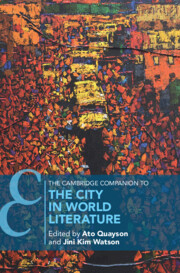Book contents
- The Cambridge Companion to the City in World Literature
- The Cambridge Companion to the City in World Literature
- Copyright page
- Contents
- Contributors
- Chronology of Political, Literary, and Cultural Events
- Chapter 1 Introduction
- Part I Critical Approaches
- Part II Spotlight Literary Cities
- Chapter 5 The Neighborhood and the Sweatshop
- Chapter 6 “The Whole World in Little”
- Chapter 7 Unworlding Paris
- Chapter 8 Sketching the City with Words
- Chapter 9 Romance and Liminal Space in the Twentieth-Century Cairo Novel
- Chapter 10 Bombay/Mumbai and its Multilingual Literary Pathways to the World
- Chapter 11 At Home in the World
- Chapter 12 Imagining the Migrant in Twenty-First Century Johannesburg
- Chapter 13 Russia
- Chapter 14 “Cityful Passing Away”
- Chapter 15 From Altepetl to Megacity
- Chapter 16 (In)Visible Beijing Within and Without World Literature
- Chapter 17 Worlding Lagos in the Long Twentieth Century
- Chapter 18 Haunted Vitality
- Select Bibliography
- Index
- Cambridge Companions To …
Chapter 13 - Russia
Borders and Centers
from Part II - Spotlight Literary Cities
Published online by Cambridge University Press: 13 July 2023
- The Cambridge Companion to the City in World Literature
- The Cambridge Companion to the City in World Literature
- Copyright page
- Contents
- Contributors
- Chronology of Political, Literary, and Cultural Events
- Chapter 1 Introduction
- Part I Critical Approaches
- Part II Spotlight Literary Cities
- Chapter 5 The Neighborhood and the Sweatshop
- Chapter 6 “The Whole World in Little”
- Chapter 7 Unworlding Paris
- Chapter 8 Sketching the City with Words
- Chapter 9 Romance and Liminal Space in the Twentieth-Century Cairo Novel
- Chapter 10 Bombay/Mumbai and its Multilingual Literary Pathways to the World
- Chapter 11 At Home in the World
- Chapter 12 Imagining the Migrant in Twenty-First Century Johannesburg
- Chapter 13 Russia
- Chapter 14 “Cityful Passing Away”
- Chapter 15 From Altepetl to Megacity
- Chapter 16 (In)Visible Beijing Within and Without World Literature
- Chapter 17 Worlding Lagos in the Long Twentieth Century
- Chapter 18 Haunted Vitality
- Select Bibliography
- Index
- Cambridge Companions To …
Summary
The Moscow/St. Petersburg binary shapes Russia’s symbolic geography. Moscow is the self-styled inheritor of Kyivan Rus’, the medieval Slavic state located in what is now Ukraine (where, at the time of writing, the Russian Federation is waging a bloody war of conquest). By “absorbing” the Kyivan heritage, the state now governed from Moscow has at times effected Ukraine’s symbolic erasure, moving the “center” of East Slavic culture five hundred miles to the east. And yet Moscow’s supposed centrality derives meaning largely from the peripheralness of anothercapital, St. Petersburg, foundedin 1704 by the coercively westernizing emperor Peter the Great. For two centuries Petersburg—a center situated on a geographic periphery, the capital of an outward-looking empire—was everything Moscow was not: new, bureaucratic, “western,” symbolically masculine, ethnically hybrid. This opposition has worked to dilute the meanings attached to “provincial” places, i.e., virtually all places located outside the two capitals butnotin exotic non-Russian borderlands like the Caucasus. Taking as examples Tatiana Tolstoya’s “Fakir” (1986, Moscow) and Evgeny Zamiatin’s “The Cave” (1920, Petersburg), this chapter examines how the Russian worldview—particularly Russians’ anxious perception of themselves as provincials—can inform World Literature debates around centers and peripheries.
- Type
- Chapter
- Information
- The Cambridge Companion to the City in World Literature , pp. 201 - 216Publisher: Cambridge University PressPrint publication year: 2023

